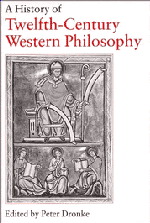Book contents
- Frontmatter
- Contents
- Preface
- Contributors
- List of abbreviations
- Introduction
- I Background
- II New Perspectives
- III Innovators
- 9 Anselm of Canterbury
- 10 Peter Abelard
- 11 William of Conches
- 12 Gilbert of Poitiers
- A note on the Porretani
- 13 Thierry of Chartres
- 14 Hermann of Carinthia
- IV The Entry of the ‘New’ Aristotle
- Bio-bibliographies
- General Bibliography
- Index of Manuscripts
- General Index
11 - William of Conches
Published online by Cambridge University Press: 01 June 2011
- Frontmatter
- Contents
- Preface
- Contributors
- List of abbreviations
- Introduction
- I Background
- II New Perspectives
- III Innovators
- 9 Anselm of Canterbury
- 10 Peter Abelard
- 11 William of Conches
- 12 Gilbert of Poitiers
- A note on the Porretani
- 13 Thierry of Chartres
- 14 Hermann of Carinthia
- IV The Entry of the ‘New’ Aristotle
- Bio-bibliographies
- General Bibliography
- Index of Manuscripts
- General Index
Summary
In his day William of Conches's work evoked a variety of responses: admiration from John of Salisbury, his best-known pupil; scorn and impatience, it seems, from the ‘Cornificians’, who favoured a utilitarian approach to education and considered old-fashioned the thorough, painstaking study of literary expression which characterized William's teaching; alarm and anger from some who feared they saw unorthodox, unchristian influences at work in his philosophy. The manuscript tradition suggests that in the years which followed his death (some time after 1154) William's writings attracted many readers, compilers, and excerptors. His two systematic works, the Philosophia and the Dragmaticon, are each known in around seventy manuscripts, and many of his sets of glosses on texts, particularly those on the Timaeus and on Boethius’ Consolation of Philosophy, were also widely copied and used. After many centuries of neglect William has been drawing considerable scholarly interest for the past hundred years and more. As before, reactions differ; William's ideas and those of people associated with him have been interpreted both as original and as unduly conservative. Aspects of his system, notably his element-theory and his doctrine of the world-soul or anima mundi, are once again controversial, although they are not now being studied as theologically dangerous novel-thought and to his Platonism.
- Type
- Chapter
- Information
- A History of Twelfth-Century Western Philosophy , pp. 308 - 327Publisher: Cambridge University PressPrint publication year: 1988
- 5
- Cited by



